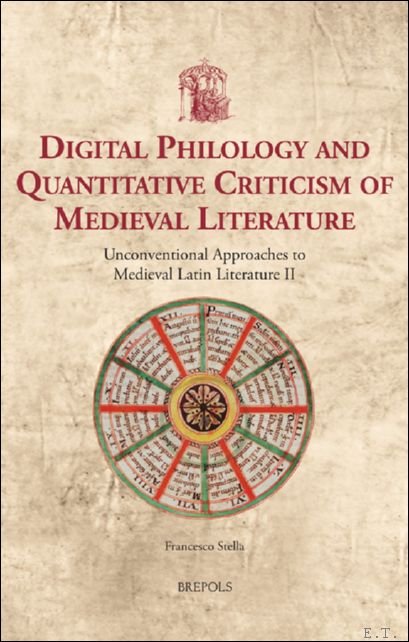Digital Philology and Quantitative Criticism of Medieval Literature. Unconventional Approaches to Medieval Latin Literature II
Digital Philology and Quantitative Criticism of Medieval Literature. Unconventional Approaches to Medieval Latin Literature II
Mode de Paiement
- PayPal
- Carte bancaire
- Virement bancaire
- Pubblica amministrazione
- Carta del Docente
Détails
- Auteur
- Francesco Stella
- Éditeurs
- , Brepols, 2021
- Thème
- Literatuurwetenschappen, Literary Studies, r Sciences, Literary Studies
Description
Hardback, xii + 279 pages, Size:156 x 234 mm, Illustrations:40 b/w, 4 tables b/w., Language: English. ISBN 9782503588018. Summary Building on The Carolingian Revolution: Unconventional Approaches to Medieval Latin Literature I (http://www.brepols.net/Pages/ShowProduct.aspx?prod_id=IS-9782503587998-1), this is the second of two volumes proposing ways of reading medieval Latin texts which, up to now, have had little or no attention within literary studies. This volume is founded on the belief that 'the unprecedented empirical power of digital tools and archives offers a unique chance to rethink the categories of literary study' (F. Moretti). The book's first section presents cases studies applying 'quantitative' criticism based on the linguistic and stylistic use of frequency wordlists which, thanks to digital tools and to a larger literature, are becoming more easily accessible and more powerful. The chapters of this section lead the reader from an application of stylometry within a traditional critical exercise, via the structured use of frequency indexing as a warning light for cultural or stylistic phenomena undetectable to the naked eye, to more technical corpus analysis experiments based on linguistic evolution or authorship attribution. The second section explores the encoding problems the author has faced when working on the realisation of digital editing projects such as the Corpus Rhythmorum Musicum, the Archivio della Latinit Italiana del Medioevo (ALIM), Lexicon, and the Eurasian Latin Archive (ELA), and proposes reflections on the typology of digital philological editions. TABLE OF CONTENTS The Mechanic Reader: Instead of an Introduction Quantitative Criticism Chapter 1. Venantius Fortunatus in Medieval Latin Poetry Chapter 2. The Representations of the Book in Carolingian and Ottonian Poetic Texts: The Birth of Paratextual Poetry Chapter 3. Europe's Name is Europa: 'Europe' and 'European' in Early Medieval Latin Texts Chapter 4. The Landscape as a Memory Construction in the Latin Petrarch Chapter 5. Generic Constants and Chronological Variations in Statistical Linguistics on Latin Epistolography Chapter 6. Statistical Indicators of Proximity to the Early Romance Languages: Experimental Applications to Early Medieval Rhythmic Poetry Chapter 7. Computer Analysis of the Lexicon and Identification of the Authors in the Epistolae duorum amantium (Twelfth Century) Digital Philology Chapter 8. Encoding Issues in Philological Digital Editions Chapter 9. Digital Philology, Medieval Texts, and the Corpus Rhythmorum Musicum, a Digital Edition of Music and Poems Bibliography Indices

